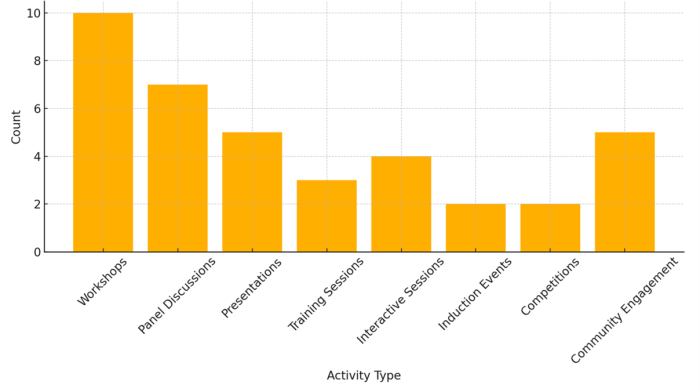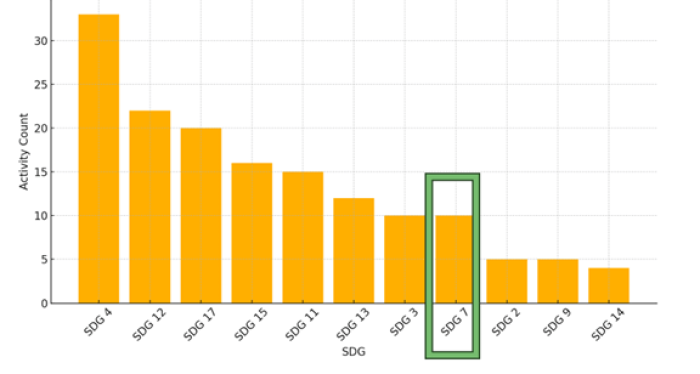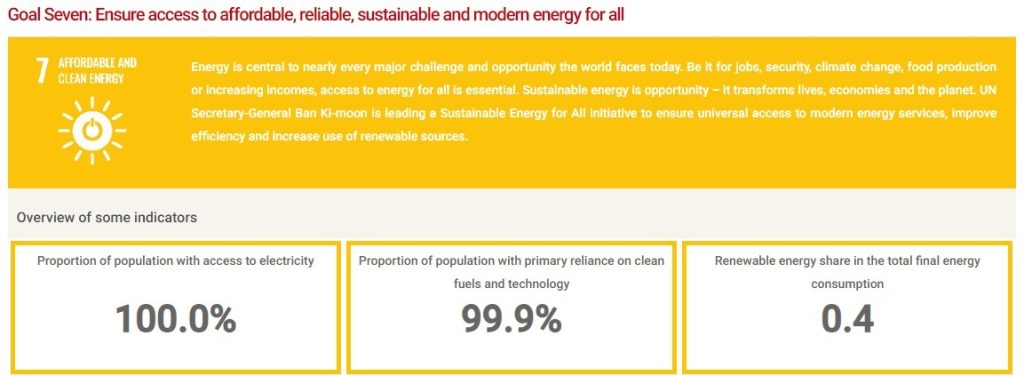Affordable and Clean Energy
Goal 7 of sustainable development is to ensure access to affordable, reliable, sustainable and modern energy for all. Gulf University is actively supporting the Kingdom’s efforts in achieving SDG 7, which focuses on Affordable and Clean Energy. By collaborating closely with the government and private sector, GU is dedicated in developing and implementing innovative solutions to promote affordable and sustainable energy sources. Through community-driven projects such as energy-efficient initiatives, and educational workshops emphasizing the importance of clean energy, GU is playing a significant role in shaping a more sustainable future for Bahrain while contributing to the advancement of SDG 7.
Through engagement with the community and addressing the underlying causes of energy challenges, the university is making a substantial impact towards the global objective of ensuring access to affordable, reliable, sustainable, and modern energy for all. A sustainability week was organized by GU and various activities were conducted related to SDG 7 which are depicted in the graph as follows:


The university conducted a total of 11 activities aligned with SDG 7: Affordable and Clean Energy during sustainability week 2024. These initiatives encompassed workshops, panel discussions, presentations, training sessions, interactive sessions, induction events, competitions, and community engagement activities. The topics covered a wide range of areas, including energy conservation, renewable energy, energy efficiency, and sustainable energy solutions. The university also invited renowned experts and industry leaders as key speakers and panelists to share their insights and experiences. By organizing these diverse activities, the university aimed to promote affordable and clean energy access for all.
There are various initiatives implemented by Bahraini government to promote affordable and clean energy. The National Renewable Energy Action Plan (NREAP) aims to increase the share of renewable energy in the country’s energy mix to 5% by 2025. The Sustainable Energy Unit (SEU) is responsible for promoting sustainable energy policies and initiatives, including the development of renewable energy projects such as solar energy.
National Energy Strategy
Bapco Energies is spearheading the development of a national energy strategy, aiming to optimize the utilization of national resources and paving the way for a low carbon future in alignment with Bahrain’s net-zero targets. The strategy focuses on Bapco Energies’ transformation from a conventional oil and gas company into a more diversified energy entity, incorporating various decarbonization options like carbon capture, utilization, and storage. Renewable Energy
Through the National Renewable Energy Action Plan (NREAP), Bahrain aims to increase the share of renewable energy in its energy mix. The Plan includes the implementation of solar and wind energy projects and aims to generate 5 percent of the country’s electricity from renewable sources by 2025, further increasing it to 20 percent by 2035. The NREAP also laid the foundation to encourage household participation in the push towards renewable energy usage. In 2017, the Net Metering Resolution was launched, which allows consumers to generate their own power from renewable energy for self-consumption and to feed the excess into the national grid, earning an energy credit on their electricity and water invoice. In 2021, the Electricity and Water Authority in cooperation with the Information and eGovernment Authority, launched the net metering system service through the Benayat Platform. In addition, the Government launched its National Energy Efficiency Action Plan (NEEAP) in 2017, which sets a national target of 6 percent reduction in energy consumption in the year 2025. The NEEAP promotes energy efficiency practices across various sectors through the implementation of 22 initiatives and has led to changing all government lighting to highly efficient lighting (e.g., LEDs), initiating the process of moving to renewable energy, issuing a green building code, and further promoting district cooling as a sustainable solution for cooling.
Electric Vehicles
In 2021, the Kingdom issued the “Electric Vehicles Technical Regulation”, to promote and adopt green transport in Bahrain. In 2023, the Ministry of Electricity and Water Affairs awarded a contract for the development of an electric vehicle (EV) strategy for the Kingdom. The Ministry has also awarded a contract for the installation of five electric vehicle charging stations across the Kingdom.
Bahrain efforts for SDG 7

Last Updated on November 27, 2024 @ 03:01:58 pm
